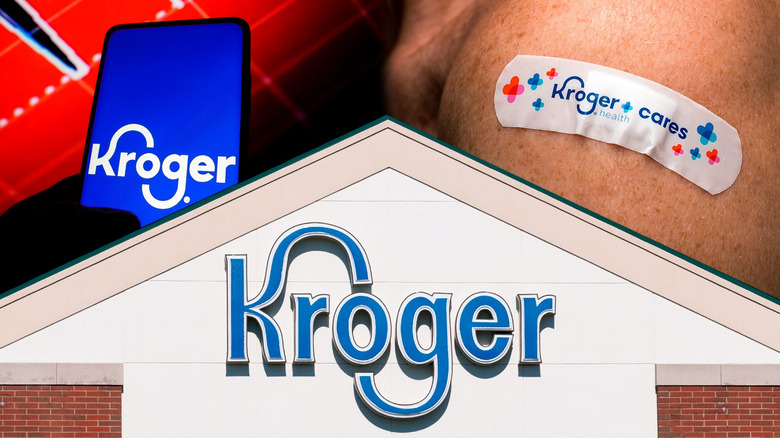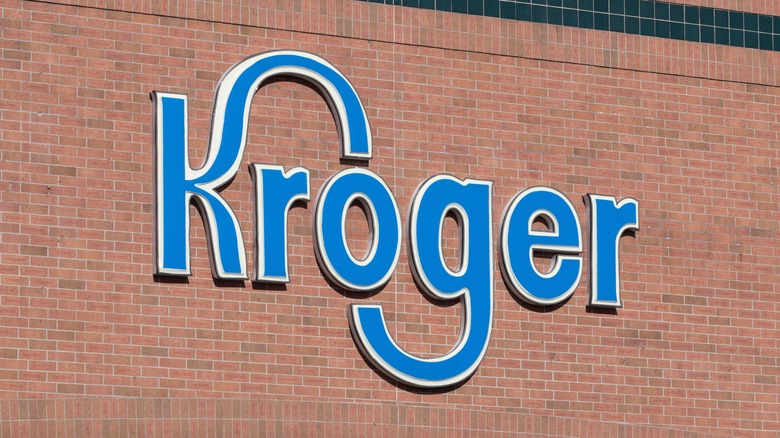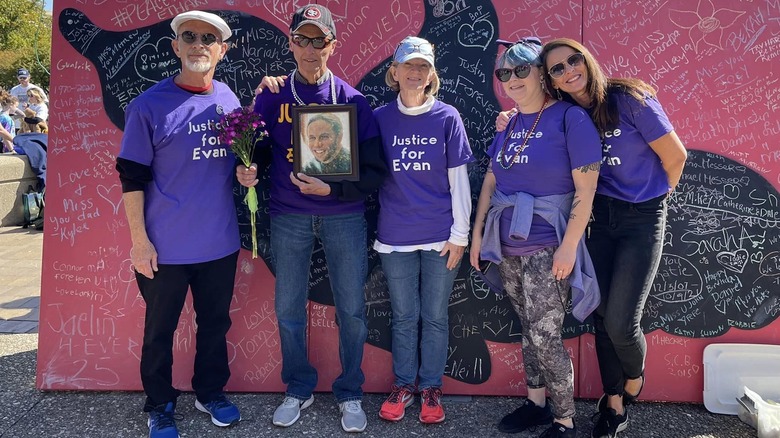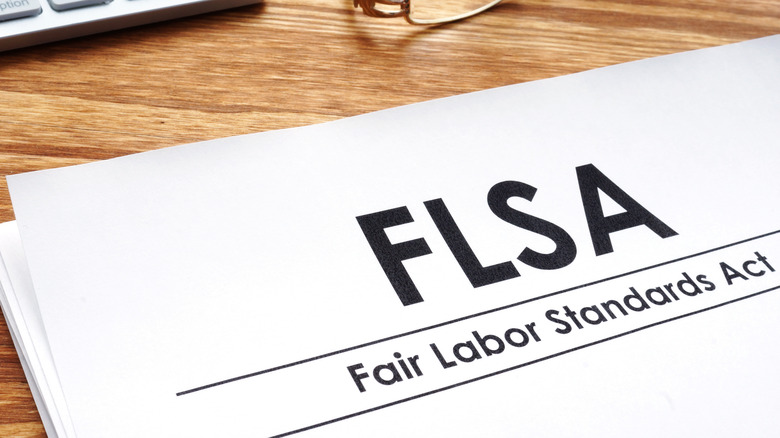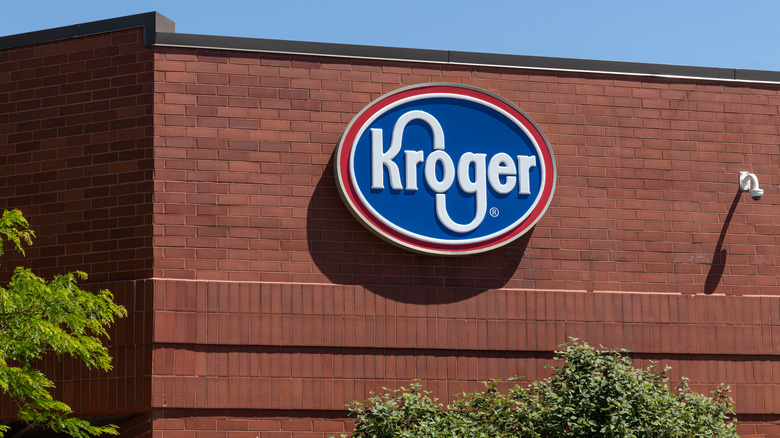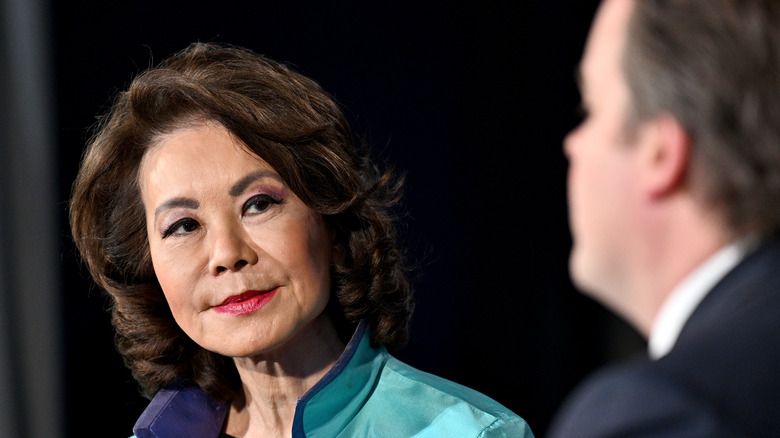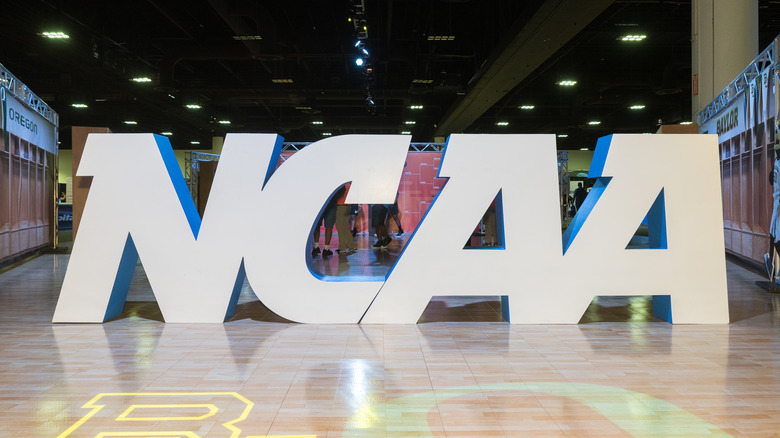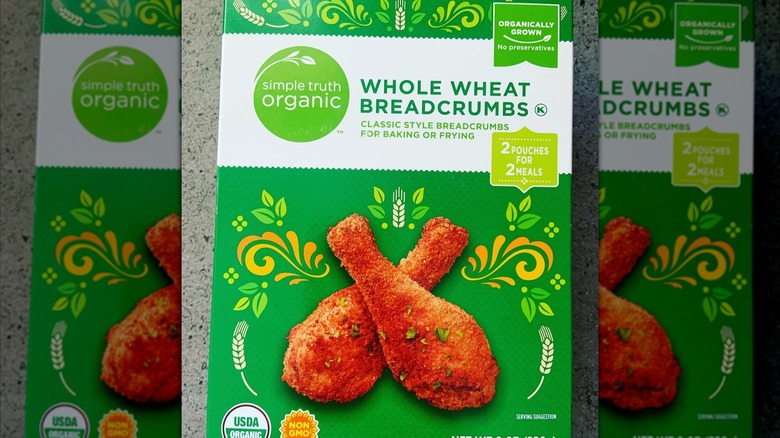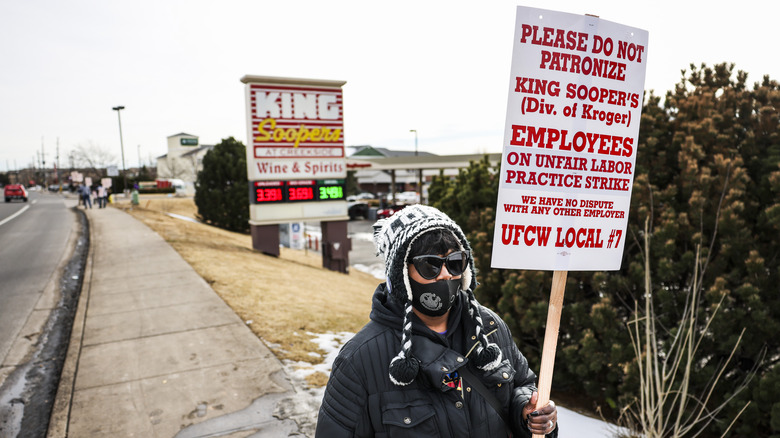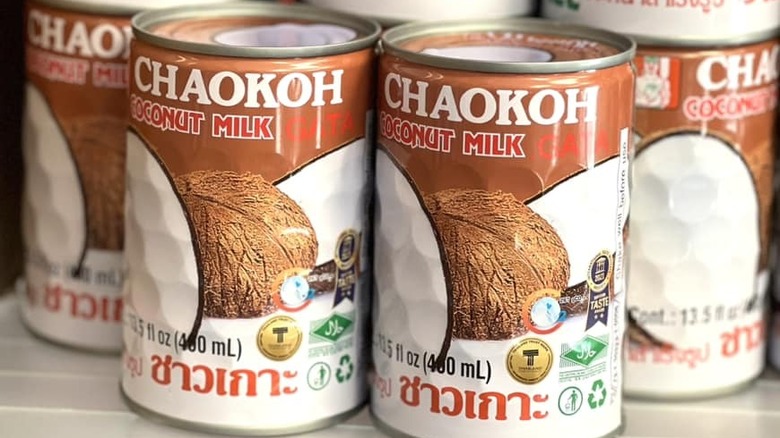13 Big Scandals That Will Always Haunt Kroger
When you need a trunk full of groceries, you likely have a reliable store that is your default stop with a familiar layout that always carries all of the products you need. One such grocer has led generations through many a shopping trip with remarkable consistency: Kroger.
Kroger has been a trusted grocery go-to for many households since its establishment in 1883 when it began as the Great Western Tea Company. From there, Kroger grew to be the first grocer to sell fresh meat and one of the first to introduce product testing. Fast forward some 140 years to today, and we can look back at Kroger's history of mergers, acquisitions, and brand changes and stand in awe at how far the business has come.
However, the history of Kroger isn't all sugar and spice and everything nice. As is the case with so many conglomerates that have stood the test of time, Kroger has experienced its fair share of scandal and drama. These controversies have thrown the business into question after generating much scrutiny and criticism. From questionable corporate decisions to shocking employee reports, here are some of the biggest scandals that will always haunt Kroger.
Workers were fired for refusing to wear a rainbow
When businesses aim to support causes in the social spotlight, it follows that not everyone will be on board. Such was the case in April 2019 when Kroger introduced a new uniform, which included an apron with a rainbow accessory and LGBTQ emblem. Two employees, 72-year-old Brenda Lawson and 57-year-old Trudy Rickerd, took issue with the new aprons and claimed that wearing them would go against their religious values. They reportedly attempted to wear it while covering the rainbow with their nametag. They also offered to wear a different apron but were told by management that both offers were insufficient. After further refusing to comply with the new store policy, Lawson and Rickerd were let go, which caused an uproar and launched the lawsuit.
The U.S. Equal Employment Opportunity Commission filed on the two ex-employees' behalves in 2020, claiming that Kroger had violated their religious freedom by terminating their employment due to the disagreement. The case quickly grabbed media attention. As of October 2022, Kroger was made to pay $180,000 to settle the case.
A Kroger manager may have pushed an employee over the edge
If you follow grocery-chain-related news, you likely heard about the July 2021 incident when a Cincinnati-based Kroger found itself in a lawsuit for allegedly causing the death of an employee. Dairy manager Evan Seyfried was known for his punctuality, reliability, and strong work ethic. Unfortunately, he died by suicide at age 40.
An allegedly abusive manager was suspected of pushing Seyfried to the edge. The lawsuit claimed that Seyfried feuded with this manager, who was known by employees to instigate conflict, and who was quoted as saying he would make Seyfried's life miserable. Supposedly, this manager's bullying of Seyfried included criticism of his choice to wear a face mask during the COVID-19 pandemic, stalking Seyfried outside of work, and mockery of his political beliefs. Seyfried had no history of mental illness and had made numerous complaints about his abusive manager.
The lawsuit claims the manager caused intentional distress, engaged in reckless conduct, and more. As of February 2023, the judge assigned to the case refused to dismiss it, per Kroger's plea, and has ruled that Seyfried's death is likely connected to the harassment that he suffered. Further court dates have yet to be scheduled, and the case is ongoing.
If you or anyone you know is having suicidal thoughts, please call the National Suicide Prevention Lifeline by dialing 988 or by calling 1-800-273-TALK (8255).
One Mississippi Kroger broke child labor laws
Child labor laws are not meant to be taken lightly, to say the least. Yet the managers of a Mississippi Kroger location seemed to forget that the Fair Labor Standards Act of 1938 prohibits certain types of work for children under 18. This includes the rule that children under 18 are not permitted to operate trash compactors, forklifts, or other dangerous machinery.
Despite this, a Southhaven, Mississippi store was reported for breaking these child labor laws after three 16 and 17-year-old employees were permitted to operate the store's trash compactor. It also violated child labor laws by allowing its young employees to work too many hours. The Department of Labor took legal action against Kroger and asked for a civil penalty of $13,673.
This wasn't the first time Kroger came up against child labor laws, either. A Fred Meyer location in Portland (also owned by Kroger) allowed minor employees to load motorized box balers, also considered dangerous equipment. This incident led to an additional $55,440 in penalties for Kroger, adding another tally to the DOL's 835 child labor violations for 2022. A spokesperson from Kroger later affirmed the company's focus on safety and apologized for the incidents.
Kroger ended COVID hazard pay, and paid for it
In 2021, Twitter users cried for a boycott against Kroger. While Kroger found itself in several controversial topics during this time, the particular outrage here stemmed from Kroger's decision to end COVID-19 hazard pay at an inopportune time. Kroger responded to COVID-19 by granting an additional two dollars per hour of hazard pay. Touted as the "hero bonus," this was given to store and warehouse workers who remained on the front lines during the pandemic's peak, as compensation for the additional risk of exposure.
The drama ensued when Chief Executive Rodney McMullen ended the raise two months later. While the timing alone was questionable, the true fury began when people learned that McMullen also collected a $22.4-million pay package, a 6% increase from the previous year and his largest personal yield since 2014. Meanwhile, employees' median pay fell 8%. Frontline workers were none too pleased to learn that their hazard pay was abruptly cut off while their head honcho was raking in extra dough.
Employee unions, individual workers, and even President Biden demanded fair compensation for workers who put themselves at risk in a public-facing role during the pandemic. The drama and complaints against Kroger persisted, leading to Kroger's announcement in March 2021 that it would raise the minimum hourly wage and give full-time workers a bonus.
Kroger allegedly tried to silence its COO after pushing him to retire
You would think that corporations would know by now that nothing stays quiet for long, especially when it comes to the bizarre departures of longtime employees. Nevertheless, Kroger found itself in yet another scandal in 2015 when its former chief operating officer was quietly bribed to resign. The previous vice president turned chief operating officer Mike Ellis had dedicated 40 years of his life to Kroger's family of stores, beginning at a Fred Meyer store at the age of 16. Despite his long tenure with Kroger, Ellis was only 18 months into his role as COO when he resigned.
With over 90,000 shares of company stock worth nearly $3 million, Ellis resigned in June 2015 with a very tight-lipped separation agreement in hand. As per the document, Ellis was required to keep all circumstances of his separation confidential and was forbidden from sharing any comments that might hurt the reputation of Kroger, its affiliates, or its employees.
While this type of non-disclosure agreement is fairly common, some attorneys have stated that this wording could indicate an unharmonious departure. While the situation may seem suspect, a Kroger spokesperson spoke positively of the separation, which it said was completely voluntary (via Cincinnati.com).
Kroger invited a controversial political figure to join its board
A 2021 Kroger controversy brought political preferences and another call for a boycott to the fore when it named its new board member – Elaine Chao. Chao was not just the Secretary of Transportation while President Donald Trump was in office but is also the spouse of often controversial Kentucky senator Mitch McConnell.
The controversy surrounding this decision went beyond Chao's political relationships, however. The Wall Street Journal revealed in 2019 that Chao was under investigation for pocketing nearly $40,000 from a construction materials company that she had promised to divest. She has also been investigated for using Department of Transportation funds and staff for personal errands, according to an internal report released in 2021.
All of this and more brought Kroger's decision to elect Chao to its Board of Directors into question. Many previously loyal Kroger customers vowed to cease funding the now politically-charged company by taking their business elsewhere. Time will tell as to whether or not Kroger's decision will lead to a decrease in sales, as earnings data beyond 2021 has yet to be revealed, as of early 2023.
Kroger got tangled in NCAA drama
One might not immediately think of the NCAA and Kroger together unless they heard about the strife between the head coach of the Louisville Cardinals, Rick Pitino, and the NCAA. In May 2020, Pitino faced accusations of recruiting violations. Drawing FBI attention, this case prompted a 75-page response from the University of Louisville. The response defended Pitino with a specific and unexpected mention of Kroger and all of its employees.
In response to the NCAA allegations, the university mentioned that Kroger and its employees would be held responsible for abiding by NCAA bylaws due to Kroger's relationship with the University of Kentucky's football stadium. It goes on to say that Kroger (and all Kroger employees) would be known as representatives of the school's athletic interests and that the university would be responsible for all conduct of Kroger employees. However, the document notes it is unlikely that this would ever be enforced. Still, it sparks curiosity as to whether or not all Kroger employees know of their responsibility to the NCAA and whether or not Kroger can really place its employees in such a situation.
It put out false advertising about breadcrumbs
Who knew that something as small and seemingly insignificant as a breadcrumb could launch legal action and trigger the payment of large amounts of money? Whether it knew all this before or not, Kroger and its lawyers are surely now keenly aware of the trouble that can come from breadcrumbs. The lawsuit, filed in January 2010, focused on an inaccurate label of a Kroger-brand breadcrumb product, which claimed that it contained no trans fats.
The lawsuit accused Kroger of false advertising after it was revealed that the product did contain trans fat since it was made with partially hydrogenated oil. This seemingly minor detail led to a class action lawsuit for all customers who made valid claims (with or without receipts) that they purchased the mislabeled breadcrumbs. Each customer could receive anywhere from $17 to $100 in funds as a result.
While Kroger has denied any intentional wrongdoing, the breadcrumbs lawsuit stretched out for well over a decade. A fairly recent update from February 2022 outlined that Kroger would agree to a $1.2 million deal to clear allegations. However, the case has yet to be officially closed.
Kroger was sued for racial bias
It's never a good look when a company is accused of discrimination. Unfortunately, Kroger found itself at the center of a heated lawsuit for just that issue. In October 2018, Kroger customer William Johnson sued the grocery chain for racial profiling. Johnson, who was 65 years old at the time, was moving through the store while carrying a couple of DVDs that he was considering purchasing for his grandchildren. Johnson reported that he was approached by store security, unfairly accused of theft, and eventually arrested.
The Ohio store in question reported its alleged observation of Johnson via the store's surveillance system. Also, it made mention of the confrontation, which took place in the parking lot between Johnson and a security officer.
After the arrest, Johnson sought out legal counsel. As of July 2020, the criminal charges against Johnson were dropped, although the memory of Kroger's accusation will likely remain.
Employees have accused Kroger of paying poverty wages
It is no secret that hourly workers nationwide are unhappy with their pay. With inflation pushing living costs higher, many Americans find it difficult to make ends meet. This is why chaos ensued when Kroger was accused of being another cog in the wheel of larger pay-related problems.
With billions in annual profits and its status as one of the largest grocery chains, Kroger's many employees might easily assume that Kroger and its multiple brands can pay its workers a liveable wage. However, a 2018 document shared with Kroger executives noted that at least 25% of its employees have to rely on governmental assistance because of the chain's low pay. The document included interviews with employees who shared their frustrations with working around food yet not being able to afford it, all while knowing their company could do better. Other comments criticized Kroger for not increasing wages for long-term employees, stating that some workers have contributed to over a decade of service with nothing to show.
This turmoil led to a three-week strike involving more than 8,500 employees. The action lasted until Kroger promised to include drastic wage increases for their workers, higher starting pay, and raises for longtime employees. However, as of September 2022, employees have argued that these promises have not seen much progress.
A Kroger clinic gave empty shots instead of COVID vaccines
When Kroger began offering COVID-19 vaccines, many across the nation flocked to their local stores to get the vaccine. Unfortunately for Kroger, one of its Virginia stores was revealed to have handed out vaccine-free shots. Customers reported that not long after receiving their shot, they received a phone call from a Kroger manager who explained that there had been an issue with their COVID vaccine administration.
Initially, these customers were told that the shot contained saline instead of the COVID vaccine, but it was later revealed that the syringes were completely empty. Supposedly, the employee administering the injections assumed that syringes were prefilled, which was not the case. Unsurprisingly, this caused real anxiety for some customers, but at least there was no embolism risk from receiving an empty shot in this instance. The Virginia Department of Health told local news outlet 8News that while injections of air into a person's veins can be deadly, the COVID vaccine goes into the arm muscle. This means that an air-filled syringe is, at least in this case, largely harmless.
In the end, the store's clinic staff was promptly retrained, and the customers in question could finally receive their injection of the COVID vaccine, this time, with meticulous attention to detail.
Kroger came under fire for mistreatment of monkeys
No business wants to fall under accusations of animal cruelty, nor does it want to be the recipient of heated criticism from PETA. Nevertheless, Kroger stepped into just that kind of discussion over its sale of one particular product: Chaokoh coconut milk. Chaokoh's brand of coconut milk was sold at many grocery stores nationwide, including Kroger locations. It was one of the leading coconut milk brands in the country, at least before its farming practices came to light.
A 2019 PETA Asia investigation alleged that Chaokoh was responsible for cruel treatment of monkeys that had been trained to gather coconuts. Investigators found that monkeys at many farms were chained, abused, and exploited. PETA claims that Chaokoh has also a reputation for kidnapping young monkeys from their families and forcing them to endure this poor treatment. This led to the call for grocery stores to cease the sale of Chaokoh's products, and 40,000 stores, including Kroger-owned ones, agreed. Kroger confirmed in June 2021 that it would sell off the remaining Chaokoh inventory and then drop the brand.
The chain was sued for selling toxic plates and plasticware
Stores have to bear in mind the many preferences of customers, including those who want nontoxic products. This is why it drew media attention when Kroger was sued for selling toxic plates and plasticware with misleading labels. Customer-turned-plaintiff David Ambrose purchased Kroger brand disposable plates and bowls which bore a compostable label. However, the products contained perfluoroalkyl and poly-fluoroalkyl substances (PFAS) which, according to the Environmental Protection Agency, are known to be toxic and may be linked to health problems like cancer. These chemicals also render the product inappropriate for composting.
The lawsuit against Kroger claimed that Ambrose and others who purchased the products would not have done so if they knew they were not compostable, as the label suggested. The lawsuit cited the green guides of the Federal Trade Commission, which state that such mislabeling is deceptive. As of September 2020, the case was still pending.
